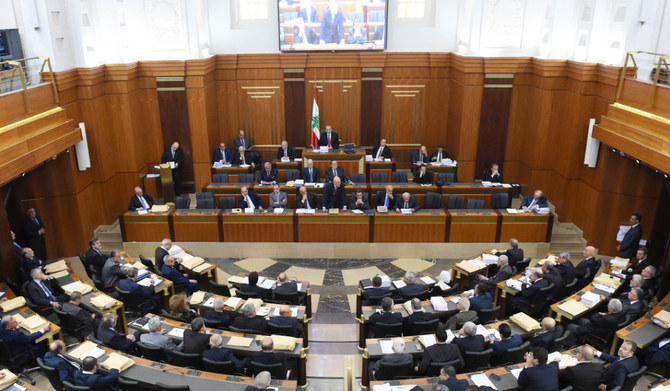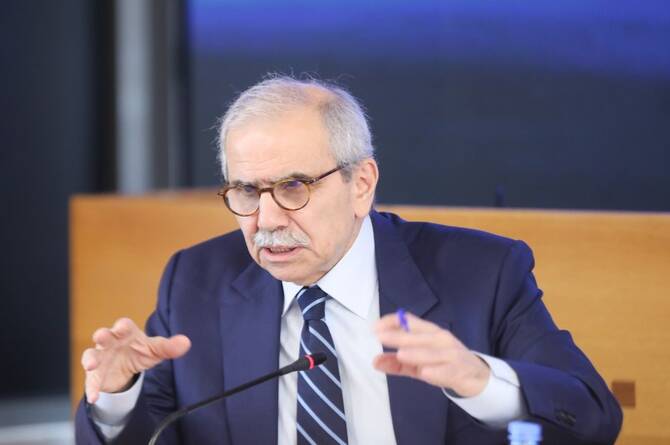Fadi Karam, of Lebanese Forces, told Arab News that “all signs were positive” that the Free Patriotic Movement, a one-time ally of Hezbollah, had agreed to endorse the nomination of Jihad Azour, currently the director of the Middle East and Central Asia Department at the International Monetary Fund.
“We reached an agreement with the FPM and we are looking for the right time to announce it officially,” he said after opposition parties met on Friday. “Each party might announce its stance, but what’s certain is that the FPM endorses Azour and will announce its stance individually.”
He said announcements could be made before Monday.
Karam added that Azour’s backers were “communicating with other parties, including the Progressive Socialist Party, the Moderation Bloc, and independents,” to secure more votes to secure the necessary 65 votes for Azour’s election. “Signs are positive,” he added.
Lebanon has been in constitutional crisis since Michel Aoun left the presidential palace seven months ago. There have been 11 failed election sessions by MPs since then, prompting the parliament speaker, Nabih Berri, to say that he would refuse another unless “at least two serious presidential candidates are presented”. He warned that “disruption and intimidation would be of no use or benefit.”
Hezbollah, the Amal Movement and their allies support the candidacy of former minister and head of the Marada Movement, Suleiman Frangieh. The FPM was Hezbollah’s ally before turning against it after it endorsed Frangieh’s candidacy.
Azour was first put forward by Christian parties and their efforts are now mainly focused on getting the FPM to approve his nomination.
Some other opposition parties meanwhile have supported Michel Mouawad.
Maronite Patriarch Bechara Al-Rahi is among the opposition forces pressing speaker Berri to schedule an electoral session.
“Berri should have called a meeting two months before the end of former president Michel Aoun’s term, but some people violate the constitution,” Al-Rahi said after returning from a trip to the Vatican.
He said the Vatican and France had asked him to “work internally with other components, so Christian parties would agree on a presidential candidate” and that he would speak to anyone, “including Berri and Hezbollah.”
Barbara Leaf, US assistant secretary of state for the Bureau of Near Eastern Affairs, said that the US administration was considering sanctions on Lebanese officials for their continued obstruction in the election of a new president.
She added in a statement: “The administration is very disappointed in the current situation in Lebanon, and is cooperating with its local and European partners to push the Lebanese parliament to carry out its duties.
“The Lebanese people’s representatives failed at doing their job, and the parliament speaker failed at holding parliamentary sessions since last January to allow deputies to nominate presidential candidates and vote for them to elect a president.”
In a visit to Lebanon in March, Leaf had warned against “the collapse of Lebanon as a state” and said that time had “started to run out.” She was surprised that there wasn’t “any sense of urgency on the part of many political leaders and deputies.”
Reformist MP Waddah Sadek said he was confident that two “serious candidates” would be officially nominated by the end of this week.
“The first serious candidate is Frangieh. Before next Monday, the second serious candidate will be announced, after receiving the approval of many parliamentary blocs and deputies,” he said.
“We will be looking forward to a speedy parliamentary session next week. If anything happens and the quorum is lost, we will consider this a new obstruction and a blow to what’s left of the country’s democracy, if any.”
Independent MP Bilal Houshaymi affirmed his support for “the Christian parties’ agreement to nominate Azour, whose professional position at the World Bank allows him to lead Lebanon’s recovery out of the abyss.”
Houshaymi said Frangieh “isn’t accepted by most Christian parties at a time when he calls for consensus.”
He said Hezbollah wanted to carry on with its statelet within the Lebanese state, even if at the expense of other components.
Mohammed Raad, head of Hezbollah’s parliamentary bloc, said: “The presidential election isn’t about the people, but rather about who wishes the resistance well and who stabs the resistance in the back.”
Raad said Hezbollah “supports Frangieh because we are confident that he will not stab the resistance in the back and he is capable of being a bridge of communication between us and the others, including our political adversaries. He is also capable of communicating with our Arab surroundings, as well as with countries concerned with Lebanese affairs.”
Those opposing Frangieh’s nomination “are prolonging the presidential vacuum period and they want to dominate the country at the service of its enemies,” he added.






















